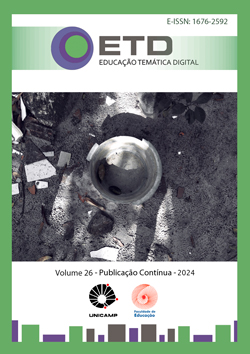Abstract
The culture of dualisms encourages and promotes the disconnection of individuals from their self-determination and self-management of life. The lapses in the dissociation between emotion and reason, inspired by Platonism and demanded in modernity, reach erroneous levels in our days, giving rise to suffering. Based on this understanding, this study proposes some reflections about the influence of the university culture in the self-management of life and the participation of this relationship in the psychological suffering of university professors. For that, the neuroscientific investigations of Antonio Damásio, were used on feelings of pain and pleasure as motivating forces of culture and the reflections of Baruch Espinosa for the surprising predictions regarding the theory of affects that predict 20th and 21st century neuroscience knowledge. To carry out this trajectory, affective hermeneutics was used to interpret the narratives of professors, as this approach allows dialogue as an intersubjective mediation, enabling the understanding of the real in its meaning, that is, the subjective meaning that each one gives to what is happening. Coping with problems is possible through the training and development of professors for self-determination and self-management of life, which requires the search for a new pedagogical horizon that welcomes and supports other guiding perspectives of culture. And this in search of the support of guiding meanings of new knowledge that incorporate emotional demands, aiming to overcome the dichotomies and ambiguities advocated by the paradigm of consciousness.
References
BIESTA, Gert. Para além da aprendizagem: Educação democrática para um futuro humano. Tradução Rosaura Eichenberg. Belo Horizonte, MG: Autêntica, 2013.
CHARLOT, Bernard. As Figuras do Diabo no Discurso Pedagógico. Revista Educação em Questão, Natal, v. 56, n. 48 p. 14-31, abr./jun. 2018.
DAMÁSIO, Antônio. A estranha ordem das coisas. Portugal: Temas e Debates, 2017.
DAMÁSIO, Antônio. E o Cérebro Criou o Homem. São Paulo: Companhia das Letras, 2011.
DAMÁSIO, Antônio. Em busca de Espinosa: prazer e dor na ciência dos sentimentos. Adaptação para o português do Brasil Laura Teixeira Motta. São Paulo: Companhia das Letras, 2002.
DAMÁSIO, Antônio. O erro de Descartes: emoção, razão e o cérebro humano. 2. ed. São Paulo: Companhia das Letras, 2005.
DAMÁSIO, Antônio. O Mistério da consciência: do corpo e das emoções ao conhecimento de si. São Paulo: Companhia das Letras, 2000.
DUNKER, Christian Ingo Lenz. Mal-estar, sofrimento e sintoma: releitura da diagnóstica lacaniana a partir do perspectivismo animista. Tempo Social, v. 23, n. 1, 2011. ISSN 0103-2070. Disponível em: <https://doi.org/10.1590/S0103-20702011000100006>. Acesso em: 27 set. 2020.
ESPINOSA, Baruch Ética demonstrada a maneira dos geômetras. Trad. Jean Melville. São Paulo: Martin Claret, 2002.
FREUD, Sigmund. Psicologia das massas e análise do eu: e outros textos. Trad. Paulo César de Souza. São Paulo: Companhia das Letras, 2009.
OSÉS-ORTIZ, Andrés. Hermenêutica, sentido e simbolismo. In: ARAÚJO, A. F.; BAPTISTA, F. P (org.). Variações sobre o imaginário: Domínios, Teorizações, Práticas Hermenêuticas. Lisboa: Instituto Piaget, 2003.
AUTOR X. O amor ao saber em tempos de hamartia. Roteiro, Joaçaba, edição especial, p. 49-70, 2014. Disponível em: https://portalperiodicos.unoesc.edu.br/roteiro/article/view/6353/pdf_60. Acesso em: 18 mai. 2020.

This work is licensed under a Creative Commons Attribution-NonCommercial-NoDerivatives 4.0 International License.
Copyright (c) 2024 ETD - Educação Temática Digital


